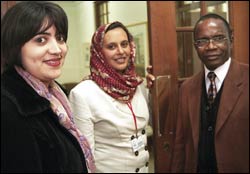Work-study office opens doors again to students in need
04 August 2003
Coming to the aid of the party: (From left) Work-Study Programme Office co-ordinator Nawaal Boolay, UFO head Tasneem Salasa and DVC Dr Benito Khotseng are keen to find work opportunities for needy students.
A few short months after shutting down its operations, a reinvented Work-Study Programmes Office (WSPO) has - with a fresh face behind the desk and a fresh philosophy inscribed in its business plan - re-opened for business, and is calling for departments to aid them in their endeavours.
The WSPO has under various guises and monikers been providing job opportunities (both on campus and beyond) for students for a number of years. Towards the end of 2002, however, it had to close down.
"The number of work opportunities in relation to student demand did not materialise," explained Tasneem Salasa, head of the Undergraduate Funding Office (UFO).
But groups such as the Students' Representative Council (SRC) and UCT Libraries exhorted the Dean of Students, Dr Loveness Kaunda, and the UFO to revisit the decision to close the WSPO. In a move spearheaded by Deputy Vice-Chancellor Dr Benito Khotseng, Kaunda and the SRC, working from a proposal by the UFO's Nawaal Boolay, it was recently agreed to reopen the office, albeit with a few amendments.
For one, the office will again focus its activities on deserving, needy students - primarily those on the UCT financial aid scheme - who need to supplement their bursaries and/or loans, or are struggling to make ends meet. And with certain legislative changes in place, international students who meet the same financial criteria can now also seek work via the WSPO.
Boolay has been seconded from UFO to serve as acting co-ordinator. The WSPO will be located in the UFO offices in the Student Development and Services building on upper campus.
Apart from finding posts for students, the WSPO will also co-ordinate students' timetables, making sure their studies dovetail with their work hours.
With outside funding - from the likes of the Desmond Tutu Trust and the Kellogg Foundation - a thing of the past, departments will now also have to pay the students they employ. Previously, the WSPO had remunerated the students.
"We realised that we would have to change the WSPO's philosophy and character," said Khotseng. "So we've taken a more strategic, a more substantial, and what we hope is a more sustainable approach, to the work of the office."
This time around, the WSPO will also be more active in finding work for students, be it on campus or elsewhere. "We've reinvented the office so we don't run into the same situation as previously where we can't find opportunities for students," said Salasa.
Khotseng called on the UCT community to identify job opportunities for the students currently being registered by the WSPO. "We would like departments and units and faculties to try and assist and find work for the many deserving, needy students, so that these students can pay their fees and support themselves."
For information about the WSPO, call Nawaal Boolay at 650-2136.
 This work is licensed under a Creative Commons Attribution-NoDerivatives 4.0 International License.
This work is licensed under a Creative Commons Attribution-NoDerivatives 4.0 International License.
Please view the republishing articles page for more information.
Related
Balancing the paddle and the law books
12 Feb 2026










